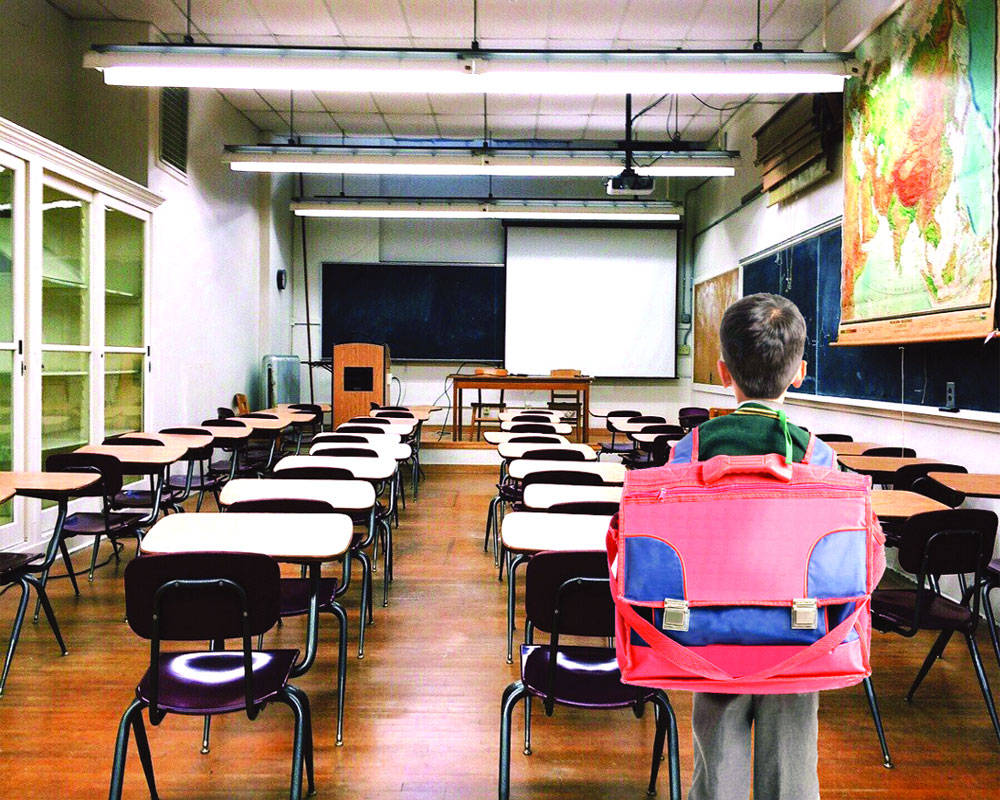Under the revised guidelines for Unlock 5, the Government has allowed schools and colleges to reopen from October 15, though in a graded manner. MUSBA HASHMI speaks to stakeholders about their preparedness to welcome children back after a long break and whether it is a risky option
A six-month long Coronavirus-forced vacation is coming to an end for many children. Unlock 5 is here and with a brand new set of guidelines. Although the Coronavirus curve is nowhere near flattening, almost everything has been opening up to give a boost to the drooping economy. Under the fresh set of guidelines, the schools and colleges are allowed to reopen in a phased manner from October 15, 2020. However, attendance wouldn’t be mandatory and that online education will still be the preferred mode of education.
The idea, however is receiving mixed response. While many think that it is high time for students to start attending schools and colleges, since education has already suffered a lot, some are still of the opinion that sending children to schools is not that great of an idea.
“The fact that physical classrooms are the best is undebatable. But having said that, keeping in mind the raging fury of Coronavirus, it doesn’t seem to be a good option to send our children to schools. We would prefer our child to learn online and make the best use of technology in the current time,” Seema, a mother of two daughters, tells you.
Alka Kapur, Principal, Modern Public School, Shalimar Bagh, New Delhi, agrees with the parents and tells you that children’s safety comes first.
“Safety comes first. Also when we take the feedback from the parents they are reluctant to send their children to school. As it is in Delhi, the curve doesn’t seem to flatten anytime soon. In fact, there has been an exponential rise in cases in the past few days and it is like every other person is infected with the virus. Even if a school like ours which has ensured maximum security and safety inside the premises, can’t ensure anything once the child steps out of the campus. Children will be commuting to and from the school and things are crazy outside, so no one could take that responsibility. As a school, we would be abiding by the Government’s order, but we don’t think that there will be much footfall in the school,” Kapur tells you.
She adds that one can’t expect much from children once they are out in the open. “Children are children. The biggest concern raised by few parents is that it has been months since their children are cooped up in their houses. And now if by the will of their parents they are allowed to go to school, they may take advantage of the situation and the norms can go for a toss. There are chances they may take the situation lightly. Though inside the school we are following proper measures because our concern is not just the students but the safety of the staff also. We may try to implement the guidelines very rigidly but it may not happen with all the schools because of lack of infrastructure and funds,” Kapur says.
Not only online classes, but online exams is also a thing. However, Kapur feels that there is no way that the essence of exams can be retained online.
“The reason is that parents take pride in marks rather than in the process. They need to understand that they have to be there with their children during the exam and make sure that their child doesn’t cheat. It is their responsibility, but I don’t know how many of them will take it seriously. The schools are doing their best, but certainly the quality and the essence of exams will be lost online,” she says.
The brick and mortar classes, she says, is the best mode of education. “While online classes are equally important in today’s time, the brick and mortar classes remains the best. In a 45 minutes or an hour’s online session, it is not possible for teachers to take attendance, do meditation and eye exercise and teach 40 or 45 students. Also a face-to-face interaction with the teachers make the students understand the concepts better and get their queries answered then and there,” Kapur says.
Ritesh Rawal, Founder, Dudes & Dolls — The Cosmic School and Adhyay School, says that to open schools, it is important to evaluate the readiness of all the stakeholders, which are the parents, administration, the teaching staff, and the school management and the center point of the school, which are the students.
“All the stakeholders are of the opinion that schools should be open but without compromising on the health and safety of the students. So schools will automatically be ready to welcome back children whenever the students are at no risk,” Rawal says.
He adds that the current situation demands a lot of self-discipline and self-control on the part of children.
“While colleges have students who are a lot more independent than the school going children and may take care of themselves and others while they are on the campus, the task lies with students studying in early classes. Such students may not be able to follow all the precautions at all times and even if they do the risk of getting infected remains. Hence, going to school during this time is not advisable, however colleges can be opened up for important activities with proper protocols in place,” Rawal tells you.
Rawal adds that both physical and online education is important as they both have their unique space and objective. “While physical classrooms setup provide a lot of opportunities to develop a children’s overall personality, online education can provide an extremely good supplementary support. A blend of both utilised correctly is the best option,” he says.
Dr RL Raina, Vice Chancellor, JK Lakshmipat University, Jaipur, tells you that the universities are well prepared to welcome students after the break.
“The universities and colleges are ensuring all precaution on campus. Higher education institutes for PhD and engineering students who are pursuing science and technology stream requires laboratory and experimental works, therefore all such institutes have to follow the strict standards of protection norms including masks, gloves, six feet distance between students and teachers and proper sanitisation facility. Having said that, asking students to attend compulsory classes is not a good idea. Even, as per the guidelines also, the physical classrooms are opening up, the online or distance learning will continue and would rather be “the preferred mode of teaching,” he says.
Looking at the arrangement done by the Ministry of Home Affairs (MHA), for students who wish to rejoin the institutes, the written consent of parents is mandatory. “Further, the ministry has asked the education institute to not enforce the compulsory attendance rules and the decision of a student attending physical classes must depend entirely on parental consent,” he explains.
He tells you that online can’t be the way forward and that for all the students who wish to rejoin the college, the universities will provide flexibility to students through hybrid education. “Online can’t be the way forward. But it will go along as a hybrid mode. What we strongly believe is that to manage space hybrid will be the way forward for sometime.We at JKLU, have created bio bubble for airspace. The universities along with other things can also create secure space in residential campuses, with flexibility in class timings and multiple slots to access facilities,” Raina tells you.
Now that the institutes are all set to reopen, Dr Ramakrishnan Raman, Director, SIBM Pune, tells you that the challenge ahead for colleges is to make education seamless. “The challenge ahead for colleges and universities is to make the experience seamless for students. Everyone is new to this scenario and hence there are no text book rules which can be followed for a meticulous fault free implementation. There are some generic guidelines that can be followed to make the experience of ‘returning back to campus’ safe and memorable. It must be ensured that the students ‘feel safe’ and ‘are safe’ when they are back to campus,” Raman says.
He lists out some measures that can help. “First, rapid test for COVID. All students who return to campus must be asked to get themselves tested for COVID-19 and this must be done two days before they return to campus. This will ensure that all students who return to the campus are not asymptomatic,” he explains.
Second, quarantine first. All the residential institutions must insist on compulsory quarantine for 15 days on arrival at campus. This needs good planning, as the available infrastructure must be put to use in an intelligent fashion which can help quarantine the students. Meticulous planning and scheduling of the student’s arrival in batches can make this happen.
Third, sanitisation of class room and hostels. “All premises must be sanitised regularly and the date of sanitisation must be displayed to all. This will bring trust of being safe among students who return to the campus. Cleanliness and hygiene must be given very high-level priority and process changes must be made for meticulous implementation,” he says.
Fourth, option to attend the session online. Classes which are conducted in the classroom must also be available online in two-way synchronous mode. This could be done using online live streaming. This will help in ensuring that the classrooms are not crowded and also will help students who are abroad — who can’t return to campus — not to miss out on the academic sessions.
Fifth, all facilities must ensure social distancing and safety. All processes including use of mess facility, tuck shop, the photocopying facility, recreation facility, etc must ensure social distancing. Use of masks and hand sanitisers and checking of temperatures before entering and leaving classroom and hostels must be made mandatory. The same process must be followed at the canteen and mess. Automatic thermal scanners can be installed to keep a check on those who have high body temperature.
“In short, meticulous planning and continuous monitoring of processes with investment in manpower and technology would be necessary for ensuring safety of students when they are back on the campus,” Raina tells you.


























